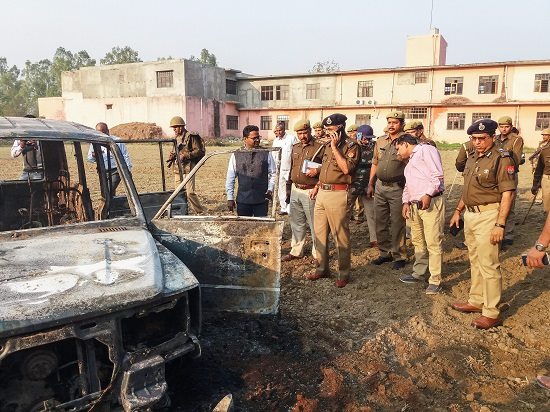A UP police station house officer (SHO), a 20-year-old and a number of cows paid with their lives for a seemingly failed attempt at inciting communal violence in Bulandshahr. The fact that the same SHO had investigated the Dadri lynching of Akhlaque makes coincidence a weak explanation for the way things appear to have panned out. In the violence that succeeded the killing, a police station was burnt to the ground and several vehicles were set ablaze. It is but yet another reminder that Uttar Pradesh has not seen any change in the way politics in that state is intermingled with crime. Witness accounts and video evidence, including those not fully trustworthy yet circulated on social media, indicate that the intention was to provoke communal hatred. The severed head of a cow, skin and meat, reports suggest, were hung up like clothes on a sugarcane field in such a way as to be visible from a long distance and hardline Hindu outfits were the first to arrive on scene to hold demonstrations. That may be an unbelievable coincidence. They also led the protests towards the Bulandshahr-Garhmukteshwar State Highway nearby in an attempt to get the incident greater attention. There is speculation that the violence was aimed at an Islamic congregation, an ijtema of Tablighi Jamaat from which believers were to return by the same highway.
The desperation of the BJP now to hold on to the reins of power is becoming evident by each passing day. The government has not been able to prove its ability in ensuring development for all and has returned to its time-tested instrument of communal hatred to see if it can change fortunes at the next general election. Rightwing and far-Right parties have succeeded to some extent in polarizing public opinion on communal lines in few pockets in the country, notably Kerala with its machinations in the Sabarimala issue. Although it is not clear yet as to what extent the polarization will translate into votes, the fact that even a state that prided itself on plurality and a secular and casteism-free social fabric is left with much introspection to do. Going by former Supreme Court judge Kurien Joseph’s remarks post retirement that the actions of the former Chief Justice of India Dipak Misra had given reason to suspect that he was being controlled from the outside adds credence to the suspicion raised from certain quarters that the Sabarimala judgement may have been influenced by ‘external forces’. The failure of the ruling party to see any progress on its Ayodhya agenda forces it to look for alternative means to redirect stoked emotions. And while the ruling party is pursuing its own interests by violent means, the opposition is not playing the role of pacifier or looking to smooth ruffled feathers. It is only catalyzing trouble, which bodes ill for the people in general. The ruling clique had emerged from a milieu of widespread disillusionment among the people with the former dispensation’s corrupt ways; but the alternative it is presenting as its tenure approaches ‘final examination’ by the electorate is terrifying. The ballot should not be turned into a sacrificial altar to meet political ends. It will pull the country further backward than it already has been as a result of inadequately weighed and improperly executed decisions.
